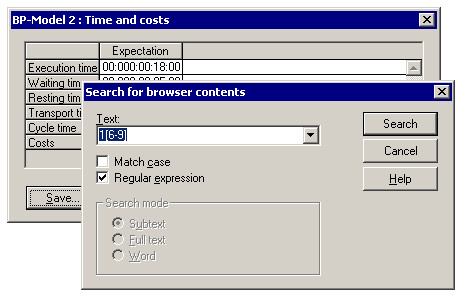Regular Expressions
A regular expression (RegEx) is a specific search text, in which special strings are used in order to make it applicable to text patterns in a file. A regular expression consists of one or more non-empty branches (=strings). These branches are connected or separated by the character "|". Example: branch | branch | branch;
If a string within the text searched meets the criteria defined by a branch, an appropriate result is displayed.

External materials
For a more general and detailed introduction to regular expressions check out the Regular-Expressions.info website.
| Regular expression - meta-sign | Description |
|---|---|
| * ? . | () [] + \ and string(s) to be searched for | Search for all characters (letters, figures, other) except * ? . | () [] + \ (=meta-signs or operators); the special function of the above signs is cancelled by putting a \ in front. Example: Search with a\*ctivity for a*ctivity. |
| . | Instead of the . any character may occur in the result. Example: w.rd finds ward, w4rd, wgrd, word, etc. |
| [] | One of the characters within the brackets must be contained in the result, but the characters within the brackets may not be combined in the result. Please note that the order of the characters searched is of no importance when using square brackets (in contrast to round brackets). Example: w[aeiou]rd finds ward, werd, wird, word, wurd but, for example, not waerd. |
| [^] | The "caret - ^" within square brackets excludes the following string from the search result. Example: wo[^0-9]rd cannot find a result like wo3rd. |
| ^ | The result contains those lines starting with the character (combination) following the caret. Example: ^word finds all lines starting with word. |
| $ | The result shows all lines ending with the character (combination) in front of the "$". Example: less$ finds all lines ending with less. If a line ends with less.$, the full stop must be cancelled by less \ .$. |
| () | Round brackets serve the grouping of character (sequences). The search result refers to the expression within the brackets. Example: (wo)+rd finds wowoword or www wo rd, but not wooord! |
| | | You can combine search criteria by describing several regular expressions. These branches are connected or separated by the character |. Example: (w.rd | less | .)s; a string is displayed if it meets the criteria of at least one branch, e.g. words, wards, lesss |
The three following operators always refer to the character immediately preceding the operator:
| Regular expression - meta-sign | Description |
|---|---|
| ? | The character preceding the "?" occurs either once or not at all (? represents the quantity 0). Example: wo?rd finds the result wrd or word. |
| * | The character preceding the "*" occurs either not at all (* represents the quantity 0) or up to an indefinite number of times. The search result for wo*rd is either wrd or word, woord, wooord etc. |
| + | The character preceding the "+" occurs either once or up to an indefinite number of times. The search result for wo+rd is either word or woord, wooord, woooord, .... |
Escaping Characters
It is necessary to escape certain characters in a regular expression that have a specific meaning. For example the \ character is used to escape the following character, the + character is used to indicate "one or more" occurrences or . character used as a placeholder for "any possible character". To have these actual characters as part of a regular expression pattern they have to be escaped like \\, \+ and \. respectively.
Sometimes regular expressions have to be specified as part of a string value, especially as part of code in some attribute facets or in AdoScript. Strings also use certain characters that must be escaped, like \ to \\ or " to \". This means that a regular expression must be escaped twice when it is specified as part of a string literal, like:
| Specific character to match | Escaped in RegEx | Escaped in RegEx as a string |
|---|---|---|
\ | \\ | \\\\ |
+ | \+ | \\+ |
. | \. | \\. |
" | " | \" |
.+ | \.\+ | \\.\\+ |
| any character once or more | .+ | .+ |
| ... | ... | ... |